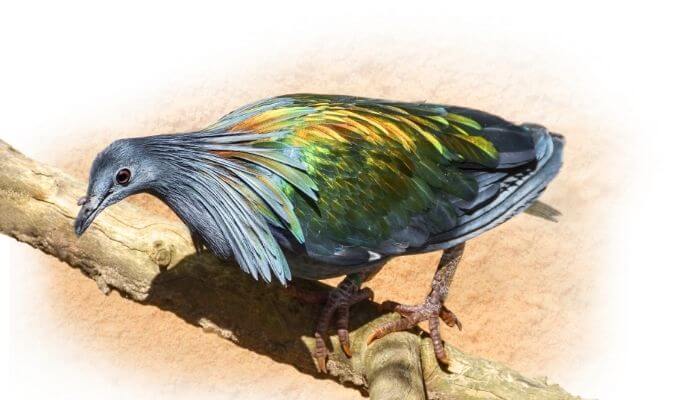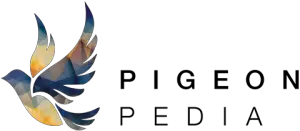One of the most beautiful species of pigeon, the Nicobar pigeon is also one of the most endangered species.
Its beauty makes it desirable as an exotic pet and here we look at this, considering the issues of
- The legal question of ownership
- The ethics of ownership
- The trading of Nicobar pigeons
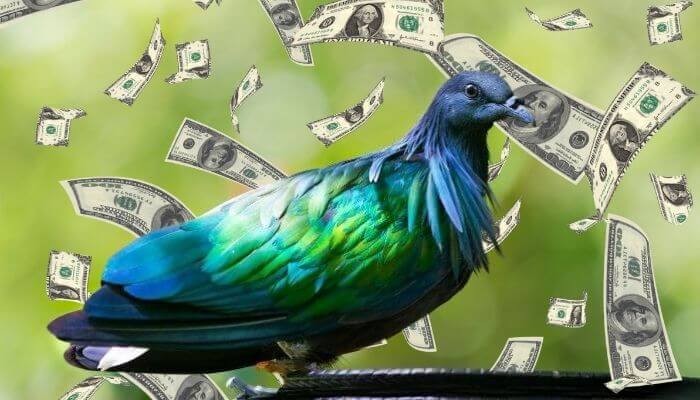
Is it Legal to Trade in Nicobar Pigeons?
The official stance is that the Nicobar pigeon is on the CITES (Convention on International Trade in Endangered Species) list and therefore it should be considered illegal for them to be traded in countries that are party to the CITES treaty (there are very few countries not signed up, countries not signed up include North Korea & South Sudan).
It is naive to think that CITES prevents the trade of any threatened wildlife, so despite it being “illegal”, people do look to sell and buy Nicobar pigeons as pets.
The Moral Argument
The issue – should you keep a Nicobar pigeon as a pet?
With stunning wildlife, especially creatures that are not threatening to humans, there are aspirations of ownership. Sometimes these aspirations are aimed at wildlife that is endangered.
There is an argument that says that private ownership is conservation – at least the species is being kept alive.
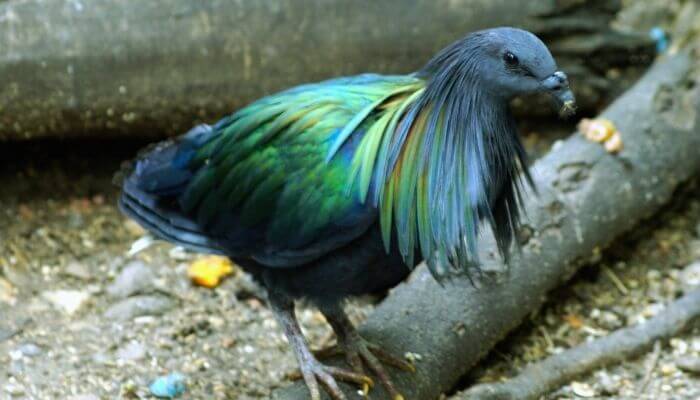
The other side of it is that it is wildlife and therefore should be left alone and conservation should be left to the experts.
Let’s look at the specific issues of the Nicobar pigeon from this perspective.
Status – This species is classed as “near threatened” by the International Union for Conservation of Nature.
This means there are only roughly 1,000 adult birds in the world.
There are a further 1,600 in zoos. The species is threatened because of loss of habitat and also they are hunted for meat.
There is also trading in Nicobar pigeon gizzard stone jewellery.
Natural Habitat – It originates from the Nicobar Islands.
The climate of these islands is tropical so consideration must be given as to how they would fare in temperate climates.
Diet – although the Nicobar pigeon has a typical pigeon diet, the seeds, berries and nuts will be from tropical plants.
A baby Nicobar pigeon wouldn’t have an issue living off a different diet from the start but an adult bird may need time to adapt.
Can You Buy a Nicobar Pigeon?
From both perspectives outlined above, the answer to this question should be an adamant no.
If, however, you do a simple search online, you will see results of advertisements of Nicobar pigeons for sale on some websites.
But if it is illegal, why are sales openly advertised?
Illegal Trading of Nicobar Pigeons
Obviously, there is an underworld trade, not just in Nicobar pigeons, but in any creature described as an exotic pet, and like something from the movies, you have to be “in the know” as to how to acquire wildlife in this manner.
Any exotic pet acquired by, let’s call it the black market for ease, is probably going to have been poached from its own habitat.
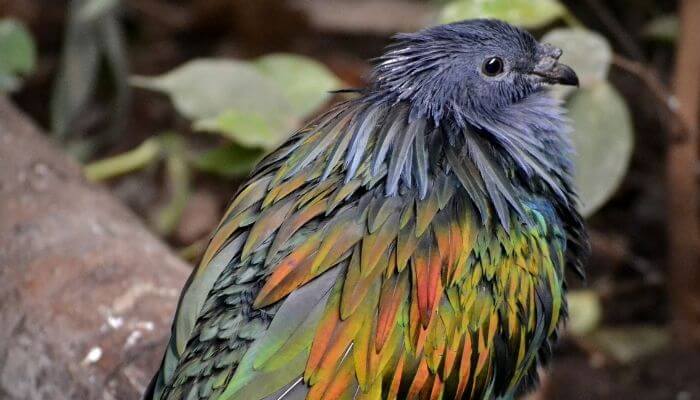
There will have been zero concern for the bird’s welfare and the potential owner will probably have to pay an exorbitant price for the acquisition.
The positive aspect of this is that the black market for Nicobar pigeons is probably (figures are not available) limited, even from a worldwide perspective.
Returning to the fact that Nicobar pigeons are advertised for sale – how is this “legal”?
Legal Trading of Nicobar Pigeons
It is a case of understanding how the law is applied.
The first point is to understand the position of CITES.
CITES is the Convention on International Trade in Endangered Species of Wild Fauna and Flora and almost all countries of the world have agreed to its terms.
The salient point is “International”. The convention applies to wildlife and plants being removed from their natural habitat and sold for profit, most often being moved to an alien environment (another country).
The next thing to understand is how CITES affects domestic trade.
Let’s use the USA as an example.
The U.S. Fish and Wildlife Service is the federal body responsible for managing, monitoring and recording all flora and fauna in the country. At the time of writing, there are 89 birds on the domestic endangered list and it DOES NOT include the Nicobar pigeon.
In fact, the Nicobar pigeon is mentioned in the notice issued by the Fish and Wildlife Service on 04/16/2020 called “List of Bird Species To Which the Migratory Bird Treaty Act Does Not Apply”.
While it remains illegal to import Nicobar pigeons and eggs, it is legal to trade when the birds have been bred in the USA.
You will find that sellers advertise their birds and eggs as having a “Captive Bred Certificate”.
Captive breeding is the process of breeding animals outside of their natural environment in restricted conditions in farms, zoos or other closed facilities.
Certification is administered under Article 7 of the CITES Treaty with each country having its own application and requirements. In the UK, for example, it is General Licence 18 (GL18) whereas in the USA it is known as the Bred-in-captivity Certificate.
If you are going to buy a Nicobar pigeon, you REALLY must check if the seller has the relevant captive breeding certification.
If possible, visit the farm or aviary to check on conditions and the welfare of the birds. When not possible to do so, search for reviews from previous customers. There are plenty of forums where feedback may be found.
You can also look for any evidence of prosecution for the illegal trade in eggs and birds (i.e. without certification).
So …
This brings us back to the ethical issue. Captive breeding is a form of conservation. While Nicobar pigeons are being sought after as exotic pets, they at least will be saved from extinction. Whether you should buy and own a Nicobar pigeon is a matter for your own conscience.
